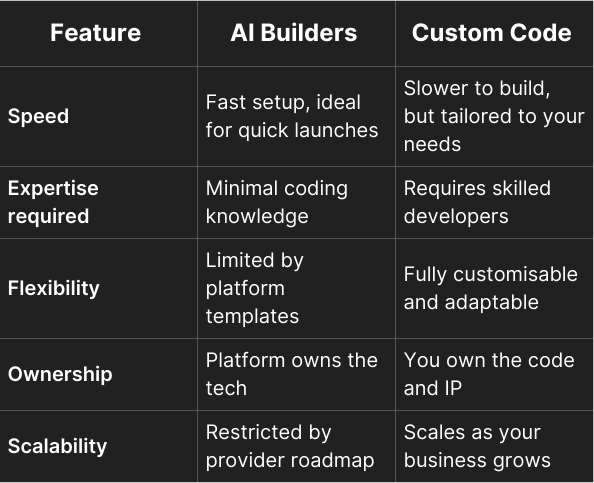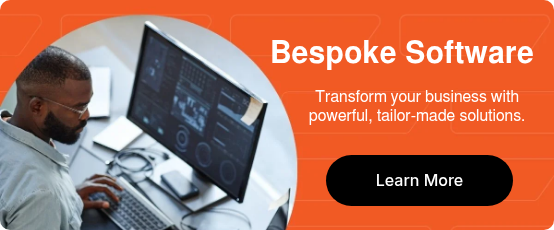It was predicted that by 2025, 70% of new business applications would use no-code or low-code tools. AI-powered website builders and no-code platforms have indeed transformed how businesses create and deploy technology. They promise speed, cost savings, and accessibility, but what do they mean for ownership, scalability, and long-term innovation?
The debate around AI website builders vs custom software ownership is not just about development style; it’s about who really owns the future of your business. When choosing between vendor lock-in vs code ownership, the decision can define how resilient, scalable, and future-ready your technology will be. Let's explore the pros and cons of each and what's right for your business.
AI Builders vs Custom Code: Key Differences
AI-driven builders let teams with limited technical expertise launch websites or apps quickly. They work well for rapid prototyping, AI business automation tools, and simple internal systems.
Custom code provides software ownership and control. It supports bespoke builds, unlimited integrations, and adaptability as business needs evolve.

Choosing between AI builders and custom code comes down to priorities. If you need speed and simplicity, AI builders can help. For long-term growth, control, and intellectual property ownership, custom code is the stronger choice.
Risks of Relying on AI Builder Platforms
The rise of AI and no-code tools has brought incredible opportunities but also significant AI builder platform risks.
- Vendor lock-in: Choosing an AI builder often means committing to their infrastructure. Switching away can result in data migration issues, redesign costs, or even the loss of features.
- AI website builder limitations: While AI tools are great for templates, they rarely offer the depth of customisation or performance optimisation needed for scaling.
- Risks of no-code development: Dependence on third-party tools means your roadmap is dictated by their platform, not your business strategy.
- AI vs traditional web development: Builders prioritise speed, but custom code prioritises longevity, security, and adaptability.
These no-code platform risks make it critical for leaders to weigh short-term convenience against long-term sustainability.
Benefits of Owning Custom Code
The custom code intellectual property benefits are often underestimated. Building your own technology means you fully own the underlying IP, ensuring intellectual property protection in tech.
Custom code offers a range of long-term benefits that AI builders cannot match. One of the most important is scalability. Unlike no-code platforms, applications built with custom code grow alongside your business, instead of forcing you to adapt to their limitations.
Another major advantage is ownership. With custom software, you decide which features to prioritise, which integrations to implement, and how your product should evolve.
Open-source technologies add even more flexibility, giving you the freedom to integrate widely used tools and reduce development costs.
Finally, custom code ensures long-term adaptability. Your technology can evolve with your business needs, rather than being tied to a provider’s roadmap.
In other words, owning your code equals owning your future.
SME Capital’s experience shows why owning your technology matters. When their business model evolved, the limitations of their existing platform became clear. By partnering with Evolved Ideas to assess risks, stabilise the system, and rebuild key components, they gained the control and flexibility needed to scale the platform in line with their long-term strategy, not a vendor’s roadmap.
How Lock-In Can Impact Your Business
Vendor lock-in vs code ownership is one of the most important considerations in digital strategy.
Lock-in happens when businesses rely too heavily on an AI builder or cloud provider. Once tied to their proprietary services, moving away can be expensive and disruptive, with data migration issues, redesign costs, or even the loss of critical features.
This dependency also limits flexibility, leaving your roadmap dictated by the provider rather than your business needs. While AI builders reduce setup time and upfront costs, they often undermine long-term scalability and control.
In contrast, owning custom code gives you the freedom to choose where to host, how to integrate, and when to pivot. Over time, this control prevents inflated expenses and helps protect innovation.
Lock-in can slow progress, increase costs, and ultimately jeopardise your long-term tech strategy planning.
Intellectual Property Advantages Explained
Intellectual property rights for software are central to ownership. If your application is built on an AI platform, the provider often retains control over significant parts of the codebase and hosting environment.
With custom software:
- You hold the IP, meaning you can license, sell, or adapt your technology.
- You benefit from intellectual property protection in tech, shielding your competitive advantage.
- Custom application development costs may be higher upfront, but the long-term value of ownership outweighs the short-term savings of AI builders.
This is where the custom code intellectual property benefits become a long-term business asset.
Making a Future-Proof Technology Choice
Every business must balance speed with sustainability. Future-proof business technology choices depend on:
- AI platform flexibility vs custom code: AI platforms adapt quickly but rarely match the flexibility of custom code.
- AI-driven business solutions vs traditional coding: AI accelerates small projects, but traditional coding ensures control and scalability.
- Long-term tech strategy planning: Future-proofing requires looking beyond today’s project to tomorrow’s opportunities.
As Colette Wyatt, CEO of Evolved Ideas, explains: “AI builders can be a fantastic entry point for experimentation, but true digital resilience comes from owning your intellectual property. Businesses that prioritise custom code have the freedom to innovate, pivot, and build technology aligned with their strategy, not bound by a third-party roadmap.”
Making the Right Choice for Your Business
The debate around AI website builders vs custom software ownership is more than a technical decision; it’s a business-critical choice about control, scalability, and intellectual property.
AI builders are quick and accessible, but carry the risk of vendor lock-in vs code ownership. Custom software requires investment but delivers long-term custom code scalability benefits and ensures your business owns its future.
The choice is not simply about cost; it’s about whether you want your business technology dictated by a platform, or designed, owned, and controlled by you.
FAQs
What are the biggest risks of no-code development?
The main risks include vendor lock-in, limited scalability, and reduced control over intellectual property.
How does owning custom code add long-term value?
Owning custom code provides intellectual property rights, scalability, and full control, making your technology a long-term asset rather than a rented tool.
Can businesses combine AI builders and custom code?
Yes. Many businesses use AI builders for prototyping or internal tools, while investing in custom code for mission-critical applications to balance speed and ownership.
%20(1)%20(1).png)
